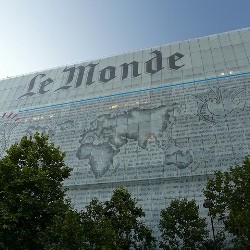Le Monde Calls For Reform Of France’s Online Poker Market

Respected French newspaper, Le Monde, recently published an article on its online platform calling for sweeping reforms to the country’s online poker market in order to save the industry from ultimate annihilation. In its May 13th piece entitled “Le poker en ligne bientôt au tapis?” (Is Online Poker Going Through The Floor Soon?), the news outlet laments the decline experienced by France’s iPoker market since it launched in 2010, with cash games expenditure plummeting 30.8% from €6.5 billion in 2011 to €4.5 billion last year. For the first quarter of 2015, France’s online poker market has also witnessed a further contraction in its gross revenues, with business down 7% to €61 million, compared to €65 million in Q1 2014, and €72 million in Q1 2013.
Winamax and PokerStars Squeeze Competition
Furthermore, a moderate rise in the popularity of tournament poker has been insufficient to offset its cash game declines, leading to an exodus of operators from the country to pursue more lucrative markets. Case in point, just a handful of sites now control France’s internet poker market, namely Winamax.fr, PokerStars.fr, PartyPoker.fr, and iPoker.fr, although Winamax and PokerStars hold a solid lead over their rivals, with a 7-day average of 1,000 and 800 cash game players respectively, according to tracking site PokerScout. Addressing this situation, Le Monde questioned why operators who had gained market share pre-regulation were subsequently allowed to profit during times of legalization, with the paper stating:
“The weakest companies have been cut out from the industry, while only giants like Winamax and PokerStars managed to survive, as they have their hands on three-fourths of the whole market. These two foreign companies have been active in the market since long before the legalization, attracting French players well before they got their licenses from ARJEL.”
Poker’s Waning Popularity
According to Le Monde, the popularity of the game has waned significantly over the past few years leading to the untenable situation currently noted in France’s online poker market. The news outlet’s view also corresponds with that of former ARJEL President Charles Coppolani who in 2014 described poker as too complicated a gambling game for younger players, resulting in a great deal of difficulty for operators to recruit new players. Likewise, Coppolani’s view that the market is mature and that “The fad is over” is supported by statistics recently released by ARJEL, which shows the number of internet poker players has fallen from 300,000 to 246,000 people. As Le Monde, states:
“In 2010 poker was booming, there were many licensed sites, and a large number of beginners tried their luck at the live and online tables. “Only four years later, the number of players has decreased.”
Restrictive Business Environment
Other factors Le Monde singles out for having affected the development of the industry includes the global financial crisis, as well as restrictive measures and taxation levied on operators. In fact, France’s 37% tax rate is one of the highest in Europe, creating an unattractive business landscape for online poker companies, in turn resulting in less attractive incentives and bonuses for the country’s players. Combined with a ring-fenced poker market in which French players are separated from those in other countries, the overall effect has been to see a massive 47% of players take to unlicensed sites.
UK Held Up As A Good Model
Interestingly, the Le Monde article closes by praising the UK for its attractive online poker market, complete with reasonable license fees, an attractive 15% taxation rate and importantly a liberated playing pool in which UK players are able to complete with people from other non-ring fenced markets across the globe. Increased traffic naturally results in ‘action on demand’, as well as a greater variety of games, tournaments, prizes and player bonuses on offer at these sites. Despite stating that the UK has hardened its stance slightly since October 2014, the paper still holds up the UK model as one which France could emulate. Calling for the country to relax its iGaming rules, Le Monde subsequently acknowledges that ARJEL’s role is mostly advisory, whilst it is the French government which ultimately decides whether to lower taxation and relax gaming restrictions. As Le Monde explains:
“The ball is now in the court of the government.. if nothing changes, online poker risks declining even further in the future.”








